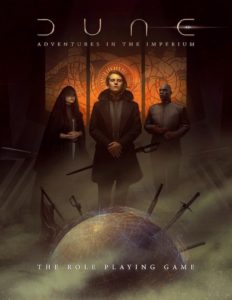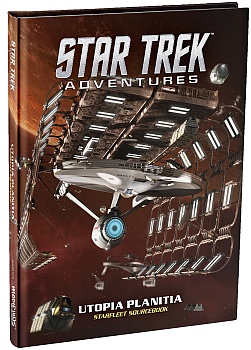
Dune: Adventures in the Imperium
Dune: Adventures in the Imperium is a science fiction role-playing game set in the Dune universe, written by Richard August, Simon Berman, Banana Chan, Jason Durall, Khaldoun Khelil, Helena Nash, Andrew Peregrine, Hilary Skyler, Chris Spivey, Mari Tokuda, Rachel Wilkinsonm, and Ben Woerner, published by Legendary and distributed by Modiphius Entertainment.
By Aaron T. Huss

Learn more about Dune: Adventures in the Imperium here
Purchase Dune: Adventures in the Imperium here (paid link)
Find other Dune posts here
A copy of Dune: Adventures in the Imperium was provided by Modiphius Entertainment for the purpose of this review.
Dune: Adventures in the Imperium is the tabletop role-playing fans have been asking for – it not only allows you to play in the Dune setting, but its inherent design is meant to replicate the feel of the setting as well. That feel centers on the social, soft sci-fi as opposed to the military, hard, or fantastical types of sci-fi. The Dune universe is somewhat feudal in design, creating an overarching theme that is going to be heavily influenced by powerful figures, which happen to be the noble houses.
I am aware of the Dune universe, but I have never read the books, played any other games, or seen any of the movies. I personally am not interested in this type of sci-fi as my leaning is toward the gothic and horror. HOWEVER, I will note that this book, the core rulebook, has a veritable boatload of setting content and serves as an incredible primer for the Dune universe. When you read through it, you start to recognize bits and pieces of the setting that were borrowed to create other major sci-fi settings. It’s almost like Dune serves as the progenitor for many other sci-fi settings, games, universes, etc. and is finally being given the treatment it deserves!!
Before digging into the game, and not just the setting, I will note that this is NOT a game for the beginner GM. In fact, you really have to want to play a game like this because it’s so different than any other game out there with the only exception being Traveller if run a specific way. The game focuses on completely different aspects of gaming such as political intrigue, what is effectively espionage, personal duels, large-scale warfare, shadowy techniques, running a noble house, and what it means to be the owner of the spice trade. It’s not high action and adventure like pulp, it’s not a military campaign like many other sci-fi games, and it isn’t bursting with fantastical elements. Everyone is human, there is no magic (although there is science and advanced human capabilities).
Dune: Adventures in the Imperium is powered by 2d20. Like all other 2d20 games, the base conflict resolution is the same from one game to another, but the character-oriented mechanics are customized for the setting. This particular version is more akin to John Carter of Mars as opposed to Mutant Chronicles or Conan. There are no skill or talent trees; there are skills, but they are the same 5 skills. What sets one character apart from another is the skill focus. Attributes don’t exist and have been replaced by mechanically the same thing called Drives. Mechanically they are the same, but they have a different way of representing the essence of the game. Instead of being what we would think of as character attributes, they are personal philosophies that drive how someone makes decisions – Duty, Faith, Justice, Power, and Truth.
Being someone not familiar with Dune outside of the primer content in this core rulebook, I love how this change in mechanics connects the rules system to the soul of the setting. It really helps you connect to the soft and social aspects of sci-fi. Talents are similar to John Carter of Mars and a character’s assets are highly important.
There are some other gems in this game. First, although the setting is Dune and everything centers on Arrakis, other planets and noble houses are detailed to provide you with more options for playing a lengthy campaign to brings you across the entire known universe. Second, the game is designed to be played with ease across the entirety of the Dune setting’s timeline. In fact, the game event provides a nice timeline of the setting and a list of what books correspond to each era. You could play game after game and campaign after campaign with nothing more than this book.
This book is incredible! It is packed with so much setting content and every inch of its mechanics bring the Dune universe to life! The artwork is intriguing and any fan of Dune needs to check it out! I would have liked to see much more Gamemastering guidance especially on how to turn a game into an entire campaign, but then the book would be way too long. That content is better left for a follow-up GM Companion or something similar.

